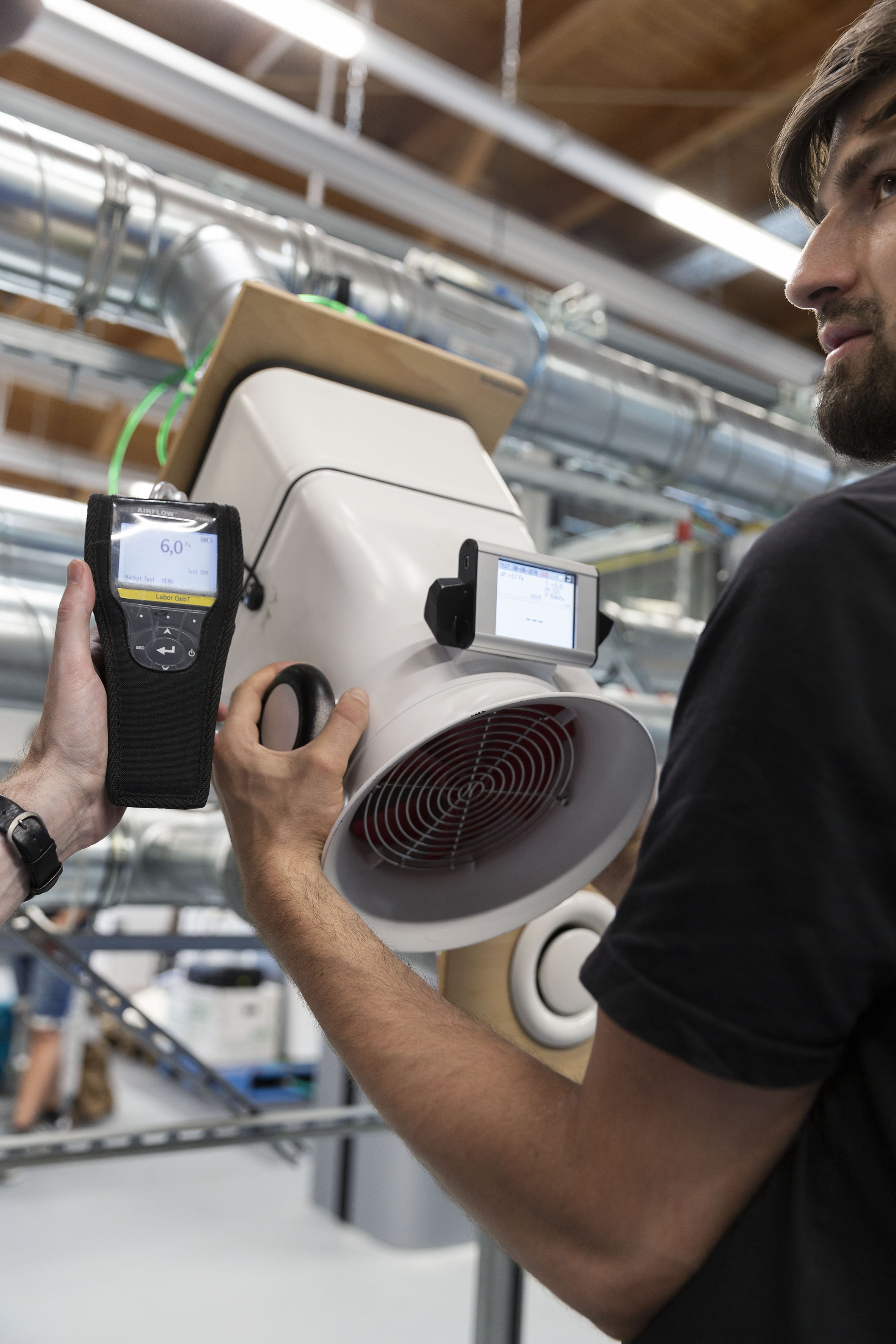Efficiency and air quality assurance of demand-controlled domestic ventilation systems - ensuring energy efficiency and air quality through quality assurance measures
Airflow Excellence möchte die Qualität von Wohnraumlüftungsanlagen sicherstellen, um Wärmeverluste zu vermeiden.
Hintergrund des Projekts
Wohnraumlüftungsanlagen sorgen für eine gesunde Raumluft und können bei Verwendung eines Wärmetauschers auch die Lüftungswärmeverluste verringern. Wie bei allen mechanischen Systemen müssen auch Wohnraumlüftungsanlagen regelmäßig gewartet werden, um einen technisch und hygienisch einwandfreien Betrieb zu gewährleisten.
Im Vergleich zu Anlagen in Nicht-Wohngebäuden wird die Funktionsfähigkeit von Wohnraumlüftungsanlagen meistens nicht regelmäßig von fachkundigem Personal überprüft. Die Anlagen sollten daher entsprechend robust geplant und gebaut werden, um über die technische Lebensdauer von 20 Jahren möglichst fehlerfrei zu funktionieren. In den letzten Jahren nimmt auch die Anzahl an bedarfsgeführten Anlagen stetig zu. Hierbei wird die geförderte Luftmenge an den tatsächlichen Luftbedarf im Haus angepasst.
Hierfür wird ein Sensor für die Anwesenheit oder die Luftqualität benötigt. Ziel einer Bedarfsführung ist es, den Energiebedarf für die Lüftung zu verringern, bei gleicher oder besserer Luftqualität. Dies funktioniert jedoch nur bei korrekt arbeitenden Sensoren. Im ungünstigsten Fall hat der Sensor eine Fehlfunktion und die Lüftung läuft unbemerkt lange Zeit auf hoher oder niedriger Stufe. Über die Robustheit von bedarfsgeführten Lüftungsanlagen wurde bisher wenig veröffentlicht. Im Forschungsprojekt soll der Zustand von Wohnraumlüftungsanlagen im Betrieb und ggf. Optimierungspotenziale ermittelt werden.
Projektziel
Das Projektziel ist es, den Zustand von Wohnraumlüftungsanlagen während des Betriebs zu untersuchen und eventuelle Optimierungspotenziale zu identifizieren. Hierbei liegt ein besonderer Fokus auf der Funktionsweise von bedarfsgeführten Lüftungsanlagen, deren Effizienz und Zuverlässigkeit durch die korrekte Arbeitsweise der Sensoren sichergestellt werden soll. Ziel ist es, den Energiebedarf für die Lüftung zu verringern, ohne die Luftqualität zu beeinträchtigen, und die Robustheit und Langlebigkeit der Anlagen zu gewährleisten.
Projektablauf
• Ermittlung des aktuellen Stands von Wohnraumlüftungsanlagen in Felduntersuchungen: Identifizierung von Problemstellen und Optimierungspotentialen, insbesondere im Hinblick auf bedarfsgeführte Systeme.
• Analyse des Einflusses von Fehlern und Sensorabweichungen: Untersuchung der Auswirkungen auf die Luftqualität und den Energiebedarf.
• Erstellung eines Leitfadens: Entwicklung von Richtlinien für die Planung, Umsetzung und den Betrieb von Wohnraumlüftungsanlagen.
• Entwicklung und Test von Methoden zur automatischen Fehlererkennung : Mithilfe von Messdaten sollen Fehler oder Optimierungspotentiale in Wohnraumlüftungsanlagen mit statistischen Methoden ermittelt werden.
Innovation
Die Betrachtung von Wohnraumlüftungsanlagen während ihrer Laufzeit auf Funktionstüchtigkeit umfasst die Anwendung aktueller wissenschaftlicher und messtechnischer Methoden. Dies ermöglicht eine präzise Diagnose von Funktionsstörungen und Identifizierung von Verbesserungspotenzialen. Eine umfassende Untersuchung der Funktionstüchtigkeit von Wohnraumlüftungsanlagen wurde noch nicht durchgeführt. Diese Untersuchung hilft, den Betrieb und die Wartung solcher Systeme zu verbessern und deren Betriebssicherheit weiter zu steigern.
KOSTENLOSES ANGEBOT
Für unser Forschungsprojekt suchen wir Wohnraumlüftungsanlagen, an denen wir entsprechende Untersuchungen durchführen können. Der Vorteil für den Anlagenbetreiber besteht in einer kostenlosen Überprüfung der gesamten Anlage auf Funktionstüchtigkeit und Hygiene. Dabei werden die Luftvolumenströme der Anlage überprüft und eingestellt. Zusätzlich erstellen wir einen Bericht über den Zustand der Anlage und schlagen gegebenenfalls Optimierungsmaßnahmen vor.
Bei Interesse kommen Sie gerne auf einen Projektmitarbeitenden zu oder schreiben Sie uns eine E-Mail an folgende Adresse: airflow@th-rosenheim.de
Dieses Projekt wird gefördert vom Bundesinstitut für Bau-, Stadt- und Raumforschung im Auftrag des Bundesministeriums für Wohnen, Stadtentwicklung und Bauwesen aus Mitteln der Zukunft Bau Forschungsförderung.
Project lead
Sub-project lead
Project staff
florian.aigner[at]th-rosenheim
T +49 (0) 8031 / 805 - 2926 sebastian.obermaier[at]th-rosenheim.de
Project collaboration
svenja-viola.hensler[at]th-rosenheim.de
External project collaboration
Bundesinstitut für Bau-, Stadt- und Raumforschung
Project duration
2024-07-01 - 2026-06-30Project funding

Funding programme
Innovationsprogramm Zukunft Bau



.png)
